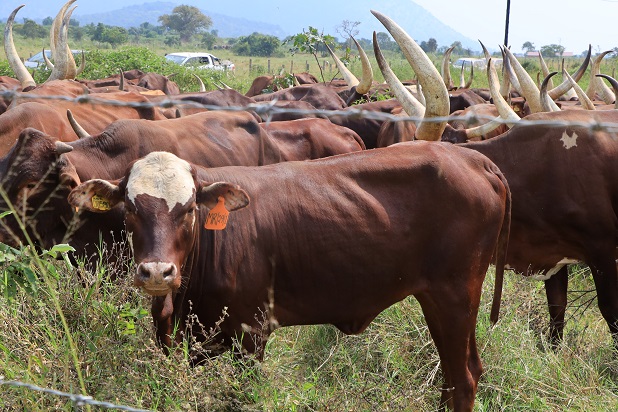Cows under the anti-tick vaccine research programme at the NARO farm in Maruzi, Apac district
The National Agriculture Research Organisation (NARO) has started piloting the anti-tick vaccine in preparation for full-blown production planned for next year.
In an interview, Andrew Kiggundu NARO’s Principal Research Officer said that initial doses have been produced following a greenlight from clinical trials and have been distributed to selected farmers.
The vaccines which include an injectable and an oral version were derived from a protein called Subolesin which was extracted from native tick species.
The injectable anti-tick vaccine is administered in the muscle of cattle around the neck region while oral vaccine is given to cattle through the mouth or mixed in a suitable cattle meal.
The drug was evaluated on five farms across the country representing five ecological zones of Uganda. They include the Mbarara ZARDI farm in Mbarara, Kiburara Prison farm in Ibanda District, the Isimba prison farm in Masindi District, Maruzi livestock research station in Apac District and Nabuin ZARDI farm in Nabilatuk District.
According to Kiggundu who is also the manager of vaccine production, the factory will be fully installed by mid-next year. However, he adds that they are still going through regulatory approvals by the National Drug Authority.
Dr Appolinaire Djikeng the Director General of the International Livestock Research Institute (ILRI) which is collaborating with NARO to revamp its research and development arm, innovations such as vaccines are vital in their efforts to reduce the use of acaricides which have not only been found to degrade the environment but are also associated with the risk of drug resistance.
With the coming of a vaccine, Djikeng who was in the country to sign a new Memorandum of Understanding with NARO among others collaborating on vaccine research and development says the country will be able to avert millions of dollars in losses that the country incurs due to tick-borne diseases.
Studies have already estimated that the country loses over 1.1 billion dollars annually due to diseases like East Coast fever, cowdriosis, anaplasmosis and babesiosis or red water that are caused by ticks.
It is also estimated that at the farm level, 80% of annual expenses in farm management are related to controlling tick-borne diseases.
Meanwhile, this anti-tick vaccine work was started about ten years ago when NARO partnered with an Institute for Game and Wildlife research in Spain to develop a jab that targets ticks which specifically infect cattle in Uganda.
-URN





